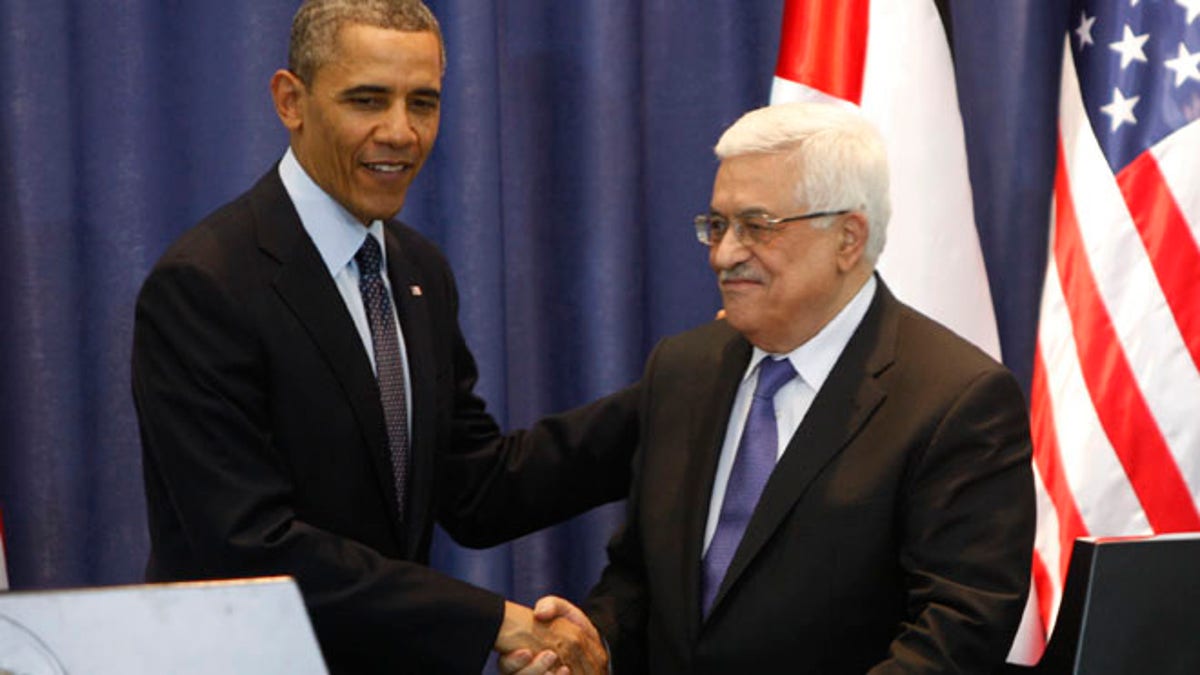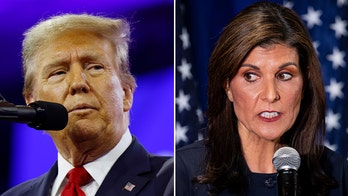
March. 21, 2013: US President Barack Obama, left, shakes hands with Palestinian President Mahmoud Abbas during a joint press conference in the West Bank city of Ramallah. Obama on Thursday urged Israelis and Palestinians to get back to peace talks but offered no new ideas on how they might do so, essentially abandoning his previous support of the Palestinian demand for Israel to halt settlement activity before negotiations resume. (AP)
President Obama renewed calls Thursday for peace in the Mideast, and said he’s still holding out hope that both Israelis and Palestinians could come to a compromise -- but admitted the process would be difficult.
“I think we can keep pushing through some of these problems and make sure that we don’t use them as an excuse not to do anything,” the president said in a joint news conference with Palestinian President Mahmoud Abbas in Ramallah, West Bank.
Obama also said the United States continues to strongly oppose the construction of Jewish housing on land claimed by Palestinians, and says that the core issues that continue to divide the two groups should not be used as an “excuse” to do nothing.
“I think we can keep pushing through some of these problems and make sure that we don’t use them as an excuse not to do anything,” he said.
Obama’s comments may rub the Palestinians the wrong way.
“Even though both sides may have areas of strong disagreement, maybe engaging in activities that the other side considers to be a breach of good faith, we have to push through those things to try to get to an agreement,” Obama said.
At the joint news conference, Obama said he had “been clear” with Israeli Prime Minister Benjamin Netanyahu that Washington did not consider continued settlement activity to be constructive to “the cause of peace.”
During Obama’s first four years in office, the White House sided with Palestinians and repeatedly demanded that all settlement activity cease.
“We require the Israeli government to stop settlements in order to discuss all our issues and their concerns,” Abbas said Thursday.
Obama’s trip to the Mideast is his first as commander in chief. He arrived in Israel Wednesday and declared that the U.S. is Israel’s “greatest friend.”
The president spoke briefly about the cause of peace, after a meeting with Israel's President Shimon Peres.
"In this work, the state of Israel will have no greater friend than the United States," Obama said.
Peres praised Obama for an "impressive record of answering our needs," and welcomed the message that "no one should let skepticism win the day."
The president made a swing through Tel Aviv before heading to Jerusalem for his meetings with Israeli leaders.
The president already has a notoriously cool relationship with Israeli Prime Minister Bejamin Netanyahu, with whom he will meet this week. But with peace talks effectively off the rails, it's unclear whether Obama can make any inroads with the new government in pursuing a two-state solution, especially in the wake of the Palestinians' defiance of Israel and the U.S. in getting the United Nations last year to recognize their statehood.
Netanyahu faces challenges of his own with the coalition government that was sworn in Monday, just two days ahead of Obama’s scheduled arrival. Netanyahu was narrowly re-elected in January but didn’t reach a deal until last week on a governing coalition, which ended up including the more centrist Yesh Atid party and the Zionist-led Jewish Home parties.
Israel was the first stop in Obama's three-day tour of the Middle East, as the region continues to deal with political turmoil and violence in hotspots like Syria.
Obama also plans to meet with Prime Minister Salam Fayyad and then will travel to Jordan to talk with King Abdullah.
The Associated Press contributed to this report.




